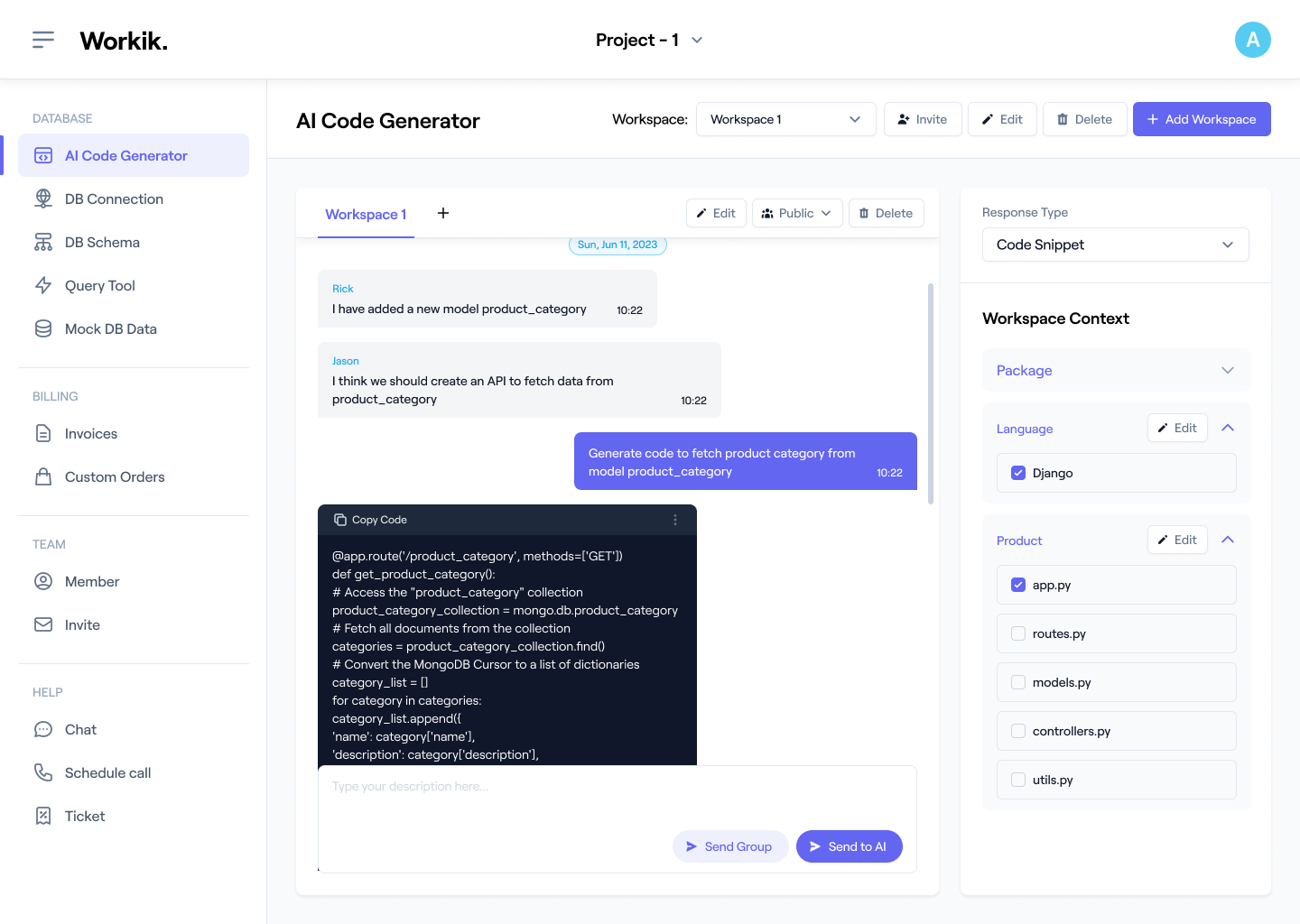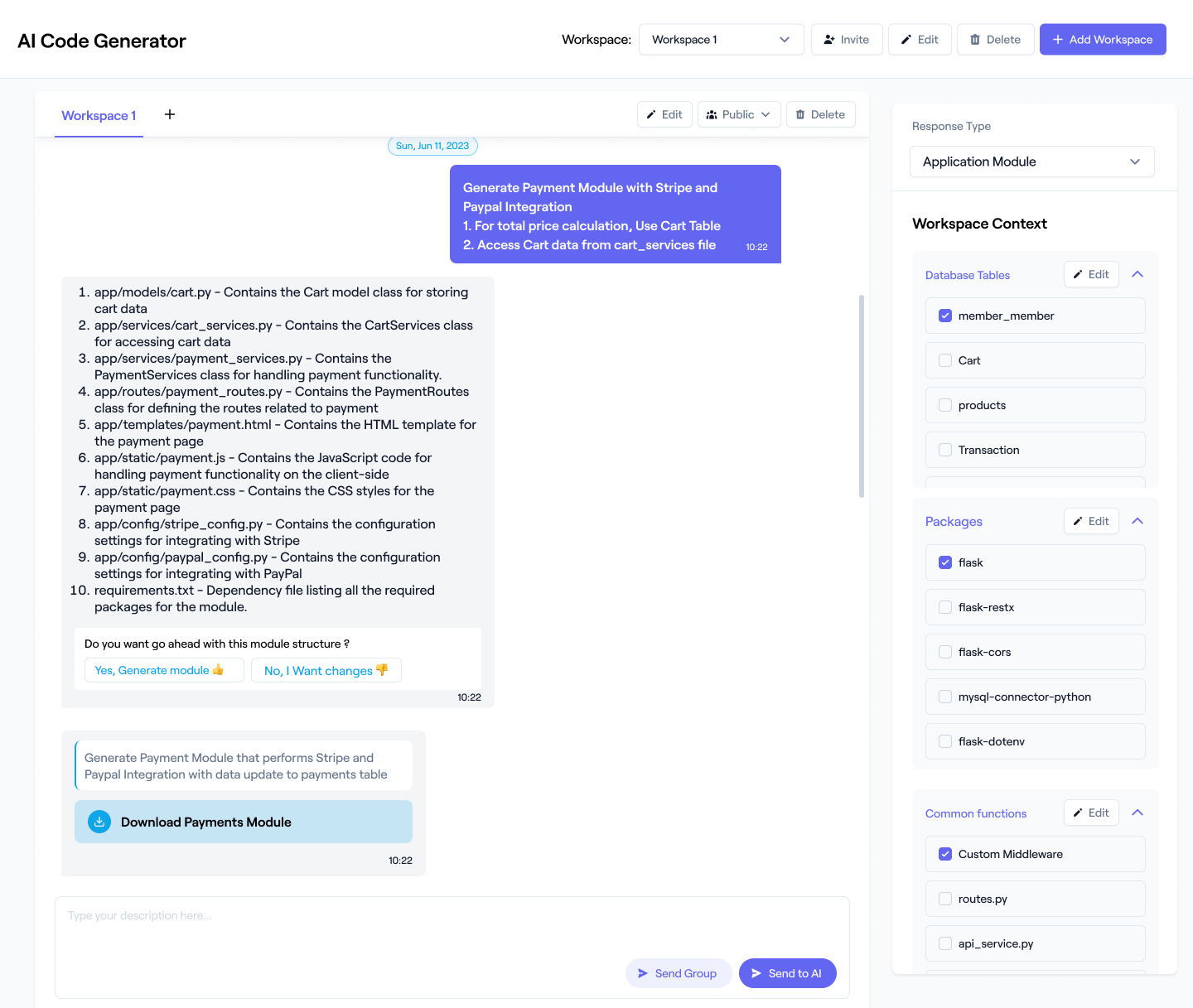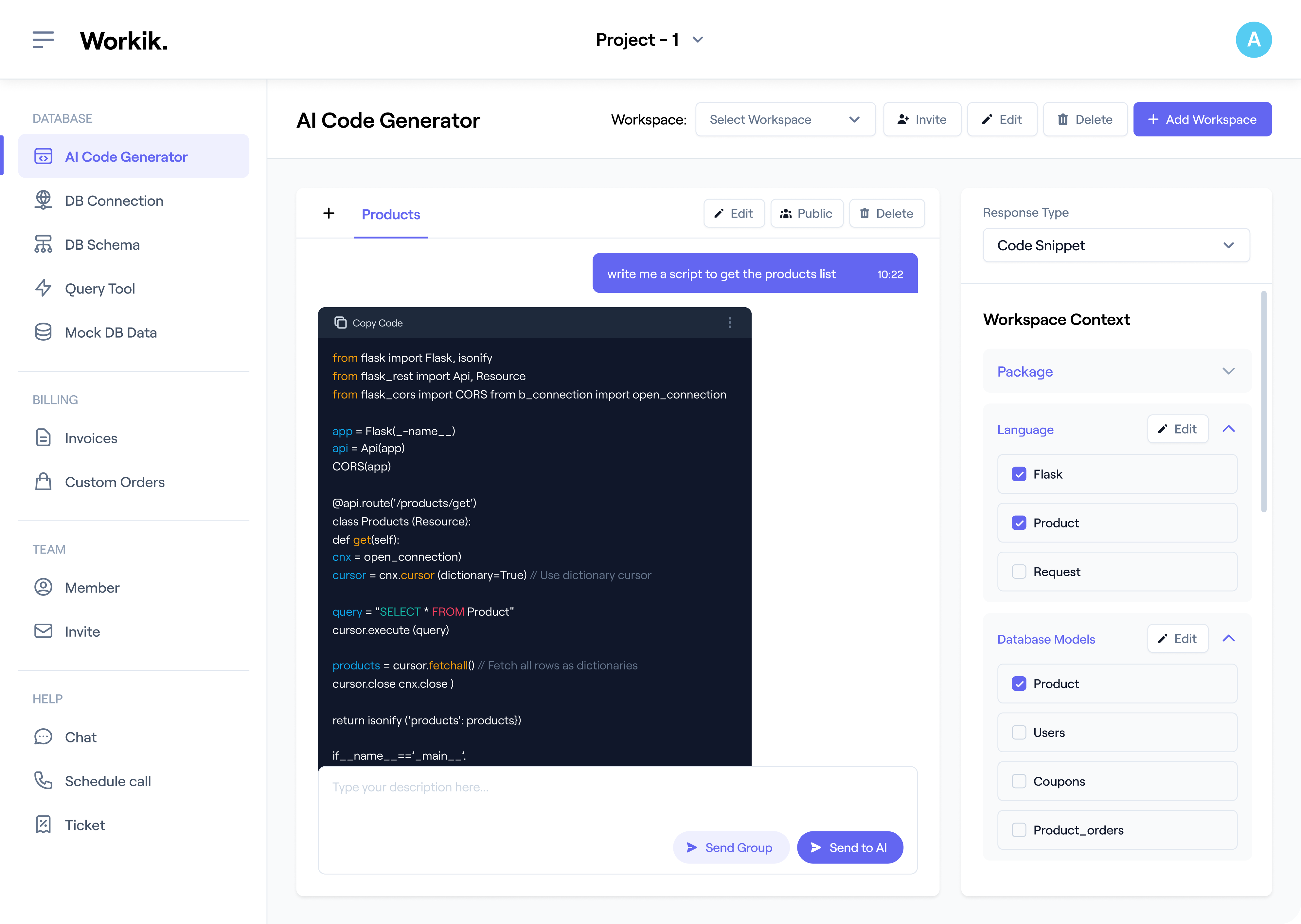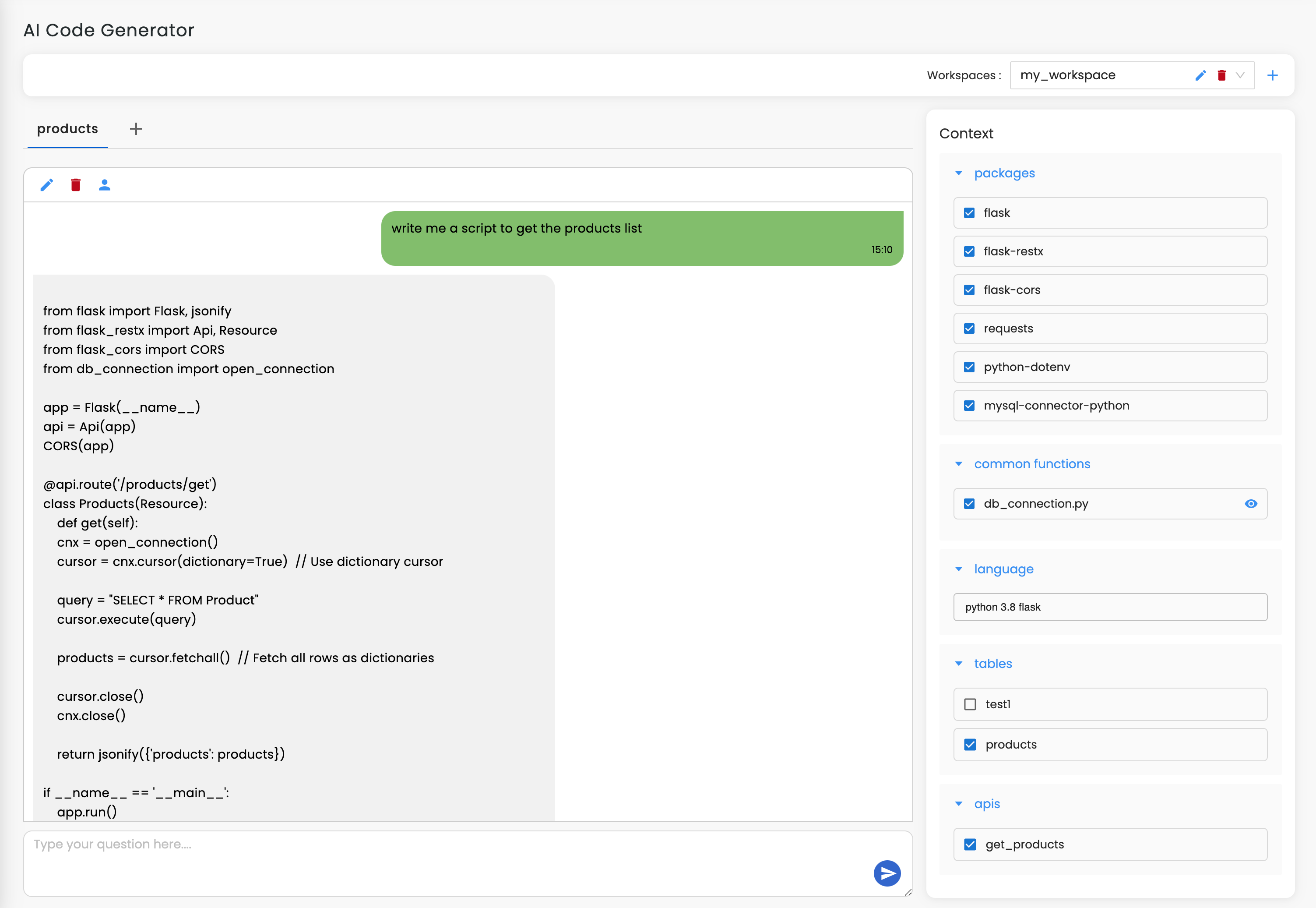
Join our community to see how developers are using Workik AI everyday.
Features

Smart Component Creation
AI creates reusable Android components like custom buttons and navigation bars and more

Code Conversion and Migration
Convert and migrate code with AI from other languages to Android-compatible Java, Kotlin, etc.

Bug Detection and Resolution
Utilize AI to identify bugs in Android code and provide solutions to fix them

Documentation Generation
AI creates documentation for code, APIs, & databases that ensures clear understanding
How it works
Sign up on Workik with your Google account or enter your details manually.
Integrate your GitHub, GitLab, or Bitbucket repositories, add Android-specific contexts like database schemas, API endpoints, libraries, frameworks (e.g., Room, Retrofit), and dependencies. Add any of your relevant contexts to personalize AI’s output.
Use AI assistance to achieve android development tasks like creating UI elements, setting up activities and fragments, handling user authentication, integrating APIs, managing databases and much more.
Invite team members to your workspace for collaborative development. Set up automated pipelines for continuous integration and testing.


Expand


Expand


Expand


Expand


Expand


Expand


Expand


TESTIMONIALS
Real Stories, Real Results with Workik
Implementing complex animations with Workik AI has transformed our app's user experience!

Mia Sanders
Senior App Developer
Our team used Workik AI to quickly integrate social media sharing features on our Kotlin based fitness app.

Max Taylor
Android Developer
Workik AI testing capabilities are impressive. It helps us catch issues early that ensures high-quality releases.

Grace Adams
QA Engineer
What are some popular use cases of AI-Assistance for Android Development?


Some of the popular use cases include but are not limited to:
1. Generate boilerplate code for activities and fragments
2. Debug and fix common errors with AI-suggested solutions
3. Generate documentation for codes, databases, and APIs
4. Set up backend services with Firebase, AWS, or Google Cloud
5. Generate unit and integration tests
6. Migrate legacy code to modern Android frameworks
7. Improve app performance through automated profiling
What context-setting options does Workik provide for AI-assisted Android development?


Workik offers a range of context setting options in order to personalize AI’s output, such as:
1. Integrate GitHub, Bitbucket, GitLab code repositories
2. Languages & Packages Used (Java, Kotlin, Android SDK, AndroidX libraries etc)
3. Dependencies (eg. Gradle dependencies)
4. API endpoints including method types (GET, POST, PUT, DELETE)
5. Define Database Schema (Room, SQLite)
How does Workik AI assistance optimize Android app performance?


Workik AI identifies performance bottlenecks in your Android app, suggesting optimizations such as memory management improvements, efficient threading, and streamlined UI rendering processes. It can refactor code to enhance speed and responsiveness.
How can Workik AI assist in optimizing battery usage for Android apps?


Workik AI analyzes your app's battery consumption patterns and provides recommendations like efficient use of background processes, sensor management, and network operations to prolong device battery life.
What kind of support does Workik offer for multi-module Android projects?


Workik AI Assistance supports multi-module Android projects by:
1. Assisting in the configuration and management of multiple modules.
2. Facilitating the use of dependency injection frameworks like Dagger or Hilt.
3. Providing best practices for communication between different modules.
Can Workik AI handle backend service integration for Android apps?


Yes, Workik AI facilitates seamless integration with backend services like Firebase, AWS, and Google Cloud. It automates the setup of authentication, database configurations, cloud storage, and serverless functions, ensuring robust backend support for your Android app.
What testing capabilities does Workik AI provide for Android development?


Workik AI creates unit tests and integration tests, ensuring thorough coverage of your codebase. It supports testing frameworks like JUnit and Espresso, helping you maintain high code quality and reliability throughout the development lifecycle.
Can't find answer you are looking for?
Request question

Request question
Please fill in the form below to submit your question.
Get Started Now

ANDROID DEVELOPMENT QUESTION & ANSWER
Android development involves creating applications for devices running the Android operating system using tools like Android Studio. Developers typically use languages like Java or Kotlin to build various components, such as activities, services, and UI elements. They leverage features like data storage, hardware integration, and connectivity to create engaging and functional apps for smartphones, tablets, and other Android devices.
Popular languages, frameworks, libraries, and more used in Android Development are:
Languages:
Java, Kotlin, Dart
Development Environments:
Android Studio, IntelliJ IDEA
Frameworks:
Android SDK, Jetpack Compose, Flutter
Testing:
JUnit, Espresso, Robolectric
UI Libraries:
Material Components for Android, ConstraintLayout, RecyclerView
Networking:
Retrofit, OkHttp, Volley
Database:
Room, SQLite, Realm
Dependency Injection:
Dagger, Hilt, Koin
Popular use cases of Android Development include:
1. Mobile Applications:
Develop native Android applications for smartphones and tablets.
2. Games:
Create 2D and 3D games for Android devices.
3. Enterprise Applications:
Build Android applications for business processes and internal operations.
4. E-commerce Apps:
Develop mobile shopping android application with integrated payment system.
5. Social Media Apps:
Create interactive social networking android applications with real-time features.
6. Educational Apps:
Build Mobile applications for online learning and educational resources.
Career opportunities and technical roles available for professionals in Android Development include Android Developer, App Developer, Mobile Developer, Java Developer, Kotlin Developer, Full-Stack Mobile Developer, and more.
Workik AI provides broad assistance in Android Development, which includes:
1. Code Generation:
Produces code snippets and templates for building Android applications.
2. Debugging:
Identifies and fixes issues in Android code with intelligent suggestions.
3. Optimization:
Recommends best practices for optimizing app performance and user experience.
4. UI Development:
Assists in implementing user interfaces using Material Design principles.
5. API Integration:
Helps in integrating RESTful and GraphQL APIs with Android applications.
6. Testing:
Aids in writing and running tests for Android applications using frameworks like JUnit and Espresso.
7. Database Management:
Provides solutions for integrating and managing databases like Room and SQLite.
8. Deployment:
Assists in deploying applications to the Google Play Store and managing updates.
Explore more on Workik
Interview Assistance
Get in touch
Don't miss any updates of our product.
© Workik Inc. 2026 All rights reserved.

